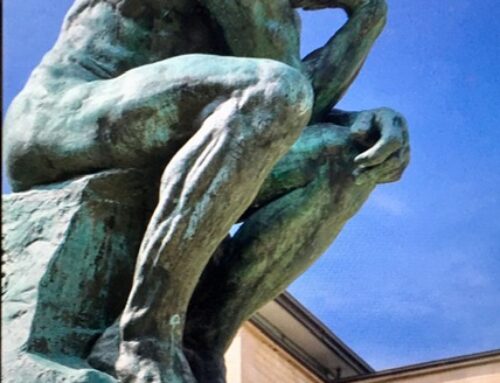
Pharisee: Bless me, Father, for my wife, kids, parents, in-laws, fellow Pharisees and neighbors have sinned. I hope I didn’t leave anyone out. Oh, yes, I’m sure that Publican behind me has sinned, too, probably grievously.
Confessor: What about YOUR sins?
Pharisee: My sins? I don’t really have any. Well, I suppose you could say I’ve been annoyed and on occasion downright angry at the terrible way other people break God’s laws. But God Himself surely feels the same way, so I don’t think my reaction is a sin—it’s more like a special intuition that enables me to see as God does.
Confessor: I think you may be confused about the purpose of Confession. It’s to ask forgiveness for what you have done wrong, not what other people have done wrong. Sorrow has to come from the sinner, not from his neighbor.
Pharisee: But that’s the problem, Father. As far as I can tell, the people I mentioned don’t feel sorrow. If they did, they would apologize for what they’ve done to me . . . and of course to God as well. And they do the same things over and over. I thought I would be a good neighbor and get absolution for them.
Confessor: That’s not the way it works.
Pharisee: That’s a shame because they really need help. I’ll continue to pray that God will grant them the grace He has given me, to understand righteousness and to walk in it.
Would anyone, even a Pharisee, actually say those things to a confessor? Surely not, but the point is not what he would say, but his underlying attitude. The point of Jesus’ parable of the Pharisee and the Publican is that the former was full of pride, whereas the latter was ashamed and repentant. Because of the Publican’s humble attitude, Jesus informs us, he alone went away justified.
The question is, how do we make the transition from an attitude of pride to one of humility?
Sometimes God provides direct help. A few years ago a friend of mine shared a very personal story. Earlier, she and her husband had experienced difficulty in their marriage. She believed he was not living up to his role as husband and father and she regularly recited the litany of his failings to him. She also prayed daily for God’s help in getting him to change.
My friend went on to explain that one day, while praying “Lord, how can I get my husband to see his failings and correct them,” she got an unexpected response. It came not in the form of a voice from heaven but a command in her mind, one that she was sure she had not formed on her own. The command was simply “Look in the mirror,” which she understood to mean, “Don’t worry about his faults—correct your own.”
She took the message seriously, stopped nagging her husband to improve, and made a conscious effort to improve herself. In time, she told me, her husband saw the change in her and began to correct his faults. As a result, their relationship greatly improved.
My friend’s experience was unusual, so it would be presumptuous to expect God to communicate so directly and dramatically to everyone. More often than not, He offers subtle clues in everyday experience and invites us to use the minds He gave us to discern the message.
How do we do that? By focusing less on our wishes, plans, desires, and expectations and more on each experience as it is occurring. By regarding each experience, even the most mundane, as a source of meaning. By observing everything happening around us with greater interest and curiosity, and considering how we can profit from it intellectually, emotionally, and spiritually. By seeing familiar people and activities with fresh eyes, trusting that there is always more to learn about them. And finally, and most importantly, by taking time each day to review what we have said and done over the past 24 hours, examine it critically, and consider how we might improve.
Reflection is more difficult today than in the past because of the technological explosion. The pace at which our grandparents lived was much slower, and they had few gadgets to dominate their attention. In contrast, we have laptops, IPads, and smart phones, and we spend a good deal of our waking time Googling, Binging, tweeting, visiting Facebook, and waiting to be alerted by “dong, You’ve got mail.”
As if the rapid pace of modern living weren’t handicap enough, our culture teaches us that critical self-examination, which sages have encouraged for millennia, is somehow unhealthy. Self-love used to be regarded as a fault; now it is encouraged. Self-esteem, which Ambrose Bierce once humorously defined as “erroneous appraisement,” is now considered necessary for achievement. (Self-respect isn’t much talked about anymore because it implies a measure of restraint.) The modern idea is to embrace and celebrate self, never to question it.
Though making the transition from pride to humility and from distraction to mindfulness is especially difficult today, doing so is essential if we are to avoid the Pharisee’s mistake and discover the spiritual insights God has embedded in everyday experience.
Copyright © 2014 by Vincent Ryan Ruggiero. All rights reserved



